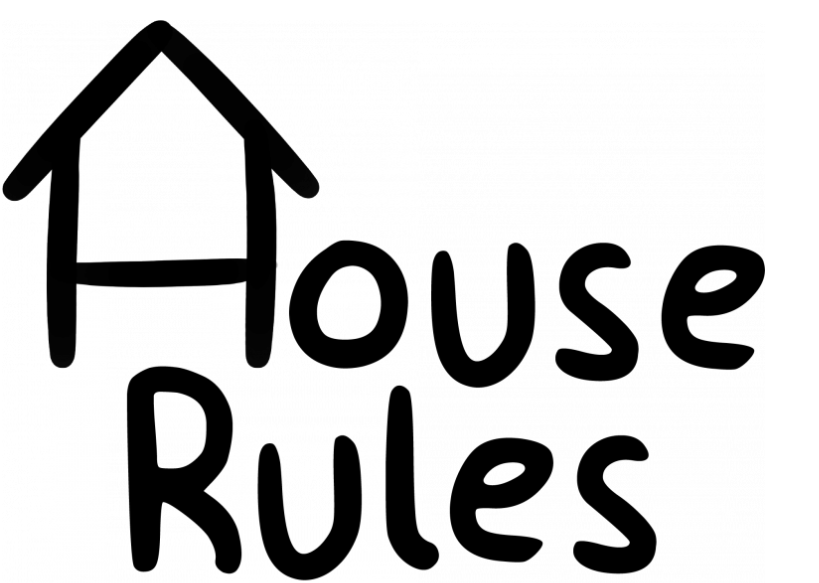Operation Inspiration
If you’ve ever played board games at home (they saved our sanity during COVID isolation) you know that though they come from the manufacturer with a list of rules, some games people have been playing for years have become a bit more fluid. We’ve come to develop “house rules,” which loosely translates into, “I know the rules say this, but we do this to make it more fun.”
It’s so widespread that many of them are well-known. For example, when playing Monopoly, when you land on Free Parking, in my house you get the money that’s in the middle of the board. You start with $500 and add as people have to pay fines. Roll snake-eyes? (That’s double ones, for you city slickers) You get one of each denomination of currency.
How about Rummikub? Despite what my wife’s grandmother would tell you, three ones is NOT forty-five, and you CAN win with a joker. However, that’s how she played and if you played with her, you had to abide by her rules.
House rules can make the games more enjoyable by helping people in clutch times. If you were out of money but got snake-eyes, suddenly you could buy that house or hotel. If you’re playing a trivia game but allow hints, that eases the competition and makes it feel more friendly and about spending time together. I recall with fondness hints I gave my mother a”h as a nine-year-old boy when she would play games with me instead of taking a Shabbos nap.
There’s another game I’d like to talk about which it would be worth your while to learn. It’s called the game of life, but it is not the “Game of Life” that has a spinner and little cars with pink and blue plastic peg people.
This is the real deal, life as we live it every day. I call it a game only in the sense that there are rules for living and the better you are at the game, the better your life. There are strategies for any game, and life is no different. While playing by the rules is important, knowing the tricks is what will put you over the top and keep you winning.
Let me give you an example. There are dos and don’ts in life. If you do a don’t, you’re going to lose points or maybe more. However, there are ways to gain leniency, much as when we gave hints to the other players in our trivia game.
Say you’re a person who gets very offended by every little thing. If you want to extract retribution from those who wrong you, what’s to stop Hashem from acting that way to you? In fact, we know that He runs the world Mida K’neged Mida, measure for measure, and if you let things slide, it will be easier for Him to act in kind. I mean, surely, a human being can’t be more compassionate than Hashem is, so He has to show His compassion.
The Gemara discusses two sages who were praying for rain. One was answered and the other wasn’t. A heavenly voice called out, “It’s not that this one is greater than the other, but he lets personal affronts slide, and [the one who didn’t get rain] doesn’t.” Since even Hashem doesn’t speak Lashon Hara, it must not have been a derogatory statement to say the one rabbi got offended, merely a statement of his nature, and a compliment to the one who was able to let things go.
That means you can get a little extra room to maneuver when you make a mistake and do something wrong, if you generally give that to others. If you choose not to demand “justice” from every offender, Hashem has reason to treat you that way too.
And I’m pretty sure I’ve passed along this other gaming tip/life hack. Since Hashem treats us as we act, if you don’t see the negative in others, He won’t see negative in you, as the posuk says, “Lo hibit aven b’Yaakov,” Hashem doesn’t gaze at iniquity in Yaakov. He can overlook your flaws if you overlook those of others. [This doesn’t mean you condone sin, but that you are able to separate the sin from the sinner and accept that not everyone is on the same wavelength as you.)
Not only that, if you refrain from speaking negatively of others, and you are not judgmental of them, then Hashem does not allow the Satan to speak negatively about you or to judge you! Imagine that! You can tie the hands of the Satan and put a muzzle on him by training yourself to be silent and forgiving!
We’re now in “Playoff Season.” With Rosh HaShana and Yom Kippur being some of the most important games of the year, the smart person would look for any edge they can get. So let me try to coach you a little.
Judge others as you would like to be judged. Err a bit in their favor and don’t call for a review of every play. You’ll get a lot further than if you nitpick, and you’ll end up on the good side of the Referee. Remember, you’re playing against His kids, and He wants everyone to have enjoyable family time.
© 2022 – All Rights Reserved
Did you enjoy this column? Feedback is welcome and appreciated. E-mail info@JewishSpeechWriter.com to share your thoughts. You never know when you may be the lamp that enlightens someone else.
